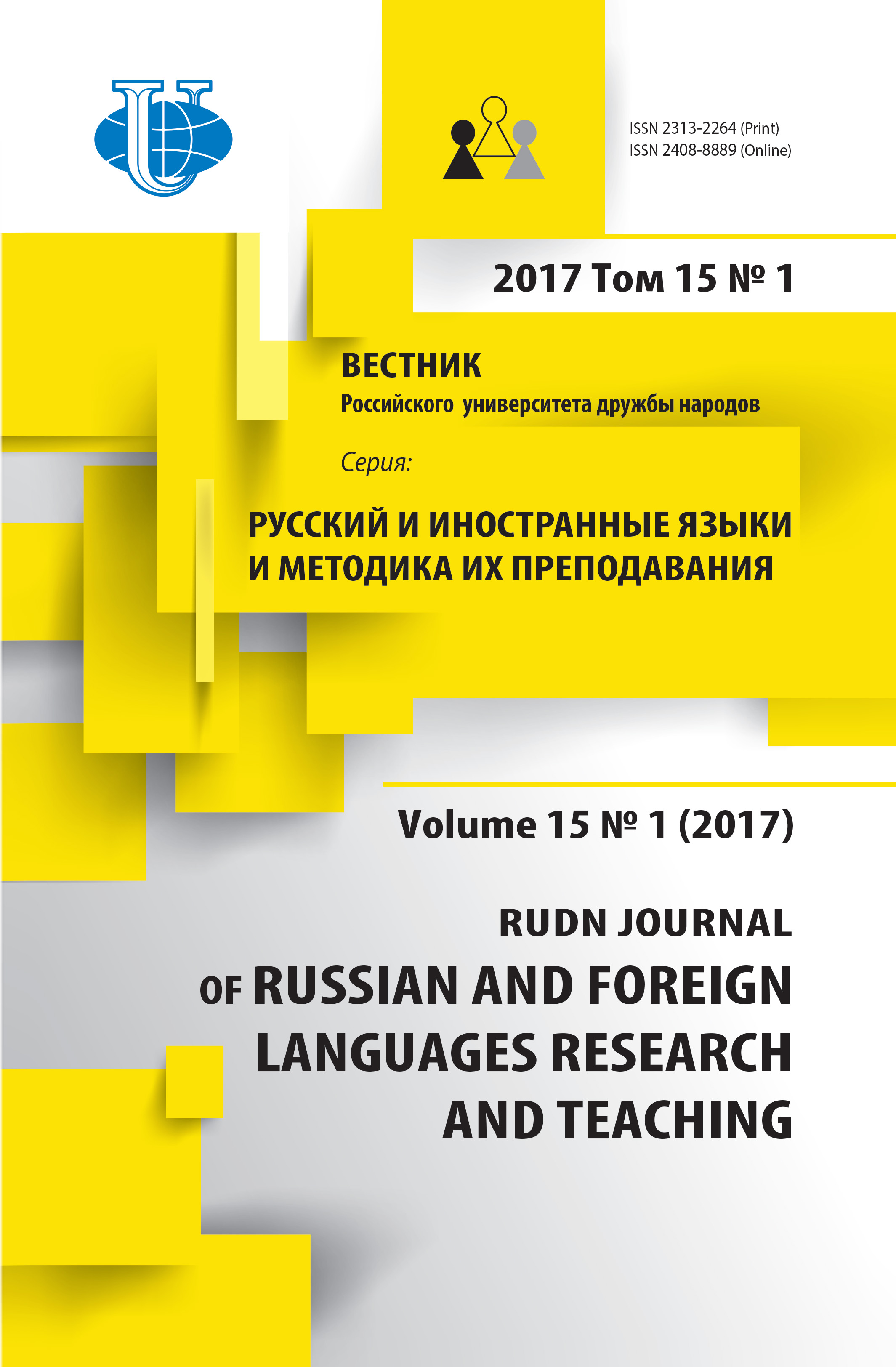STRUCTURAL AND FUNCTIONALL APPROACHES TO SEMANTIC FIELDS ANALYSIS
- Authors: Abramov VP1, Abramova GA1
-
Affiliations:
- Kuban State University
- Issue: Vol 15, No 1 (2017)
- Pages: 9-25
- Section: Articles
- URL: https://journals.rudn.ru/russian-language-studies/article/view/16026
- DOI: https://doi.org/10.22363/2313-2264-2017-15-1-9-25
- ID: 16026
Cite item
Full Text
Abstract
Functional-semantic description of vocabulary as a system of paradigms (procedural fields, semantic classes) develops the idea of modern linguistics about function as a way of uncovering semantics. Something inherent in the system is contained in function; something that the signs hide their use shows; implicit ideas of semantic fields become explicit in field units functioning. This determines the relevance of the study. The practical significance of the results is seen in the field of compiling dictionaries of Russian language compatibility, semantic dictionaries, for working out computer programs for teaching Russian as a foreign language.A comprehensive structural-functional analysis of semantic fields units in this article is based on the model of “text system (meaning)”, in a more general sense - as analysis of links “extensional (allocation) intensional (seme composition)”. In other words, the complex method of analysis relies heavily on units syntagmatic relations , their “spilt” in text semantics and includes methods of component analysis, metalinguistic descriptions, distributional analysis.Structural analysis of semantic fields (network of relations, oppositions between language system elements) allows you to allocate text units invariant and relate them to particular speech segments on the basis of strict implementation of the rules, which determine the variation limits of semantic field units. The rules of lexical units in semantic fields are shown as rules of positional distribution of specific lexical-semantic variants of units, or semems. The principle of subsidiarity is based on the method of language research of the environment (distribution - distribution context) of the individual units in the text and does not use information about all lexical or grammatical meaning of these units.The author reveals how in the semantic field of verbs of transfer some verbs express real transfers from the subject to the addressee, others suggest transfer and implement it in a special diagnostic contexts. On the one hand, transfer is presented as explicit, implicit, i.e. contextually expressed. Basing on the conducted research the author proposes the application of techniques that allow to trace the operation of semantic fields, study the processes of semantic fields formation in the context of their structure and dynamics.
About the authors
V P Abramov
Kuban State University
Author for correspondence.
Email: abramovkubgu@mail.ru
PhD, professor, chief of chair of Russian as a foreign language at Kuban State University
Stavropolskaya str., 149, Krasnodar, Russia, 350040G A Abramova
Kuban State University
Email: galeks25@mail.ru
PhD, professor of chair of publishing business and mass media technologies at Kuban State University
Stavropolskaya str., 149, Krasnodar, Russia, 350040References
- Wittgenstein L. (1994) Filosofskie raboty [Philosophical works]. Moscow: Gnosis; Part 1. P. 97. (In Rus.)
- Vinogradov V.V. (2001) Russkij jazyk. [Russian language]. Moscow: Russian language. P. 165. (In Rus.)
- Chomsky N. (2005) O prirode i jazyke / perevod s anglijskogo [On nature and language / translated from English]. Moscow: LIBROKOM. 288 p. (In Rus.)
- Chafe W. (2015) Jazyk i mysl’ [Language and thought]. Moscow: Languages of Slavic culture. P. 60—88. (In Rus.)
- Gaisina R.M. Sintaksis prostogo predlozhenija v sovremennom russkom jazyke. Teorija, shemy i obrazcy analiza [The syntax of a simple sentence in the modern Russian language. Theory, schematics and sample analysis]. M.: Higher school, 2010. 424 p. (In Rus.)
- Novikov L.A. (2001) Izbrannyje trudy [Selected works: in 3 volumes.] Vol. 1. Problemy jazykovogo znachenija [The problem of the language difference]. Moscow: Publishing house of Russian University of friendship of peoples. P. 87. (In Rus.)
- Frege G. (2000) Logika i logicheskaja semantika [Logic and logical semantics]. Moscow: AspectPress. Pp. 220—46. (In Rus.)
- Hjelmslev L. (2006) Prolegomeny k teorii jazyka [Prolegomena to the theory of language]. Moscow: KomKniga. 248 p. (In Rus.)
- Church A. (2009) Vvedenie v matematicheskuju logiku [Introduction to mathematical logic]. Moscow: LIBROKOM. 482 p. (In Rus.)
- Kuryłowicz E. Ocherki po lingvistike (2000) [Essays on linguistics]. Birobidzhan: IP “TRIVIUM”. 490 p. (In Rus.)
- Mel’chuk I.A. (2012) Ot smysla k tekstu [From meaning to text]. Moscow: Languages of Slavic culture. 176 p. (In Rus.)
- Mel’chuk I.A., Iordanskaya L.M. (2007) Smysl i sochetaemost’ v slovare [Meaning and collocation in the dictionary = Le sens et la dans le dictionnaire cooccurrence]. Moscow: Languages of Slavic cultures. 665 p. (In Rus.)
- Apresyan U.D. (1995) Izbrannye trudy: v 2 t. T. 2. [Selected works: in 2 v. V. 2.] Moscow: Languages of Russian culture. P. 280. (In Rus.)
- Kubryakova E.S. (2012) V poiskah sushhnosti jazyka: kognitivnye issledovanija [In search of the essence of language: cognitive studies]. Moscow: Znak. 208 p. (In Rus.)
- Lurija A.R. (1979) Jazyk i soznanie [Language and consciousness]. Moscow: Publishing house of Moscow University. 320 p. (In Rus.)
- Pinker S. (2013) Substancija myshlenija: Jazyk kak okno v chelovecheskuju prirodu / per. s angl. [The Substance of thinking: Language as a window into human nature / translated from English]. Moscow: LIBROKOM. 560 p. (In Rus.)
- Wierzbicka A. (1999) Jazyk Kul’tura. Poznanie [Language. Culture. Knowledge]. Moscow: Languages of Russian culture. 416 p. (In Rus.)
- Сarnap R. Znachenie i neobhodimost’. Issledovanija po semantike i modal’noj logike [The naming and necessity. Research in semantics and modal logic]. Moscow: Publishing house of foreign literature, 1959. 384 p. (In Rus.)
- Bol’shoj tolkovyj slovar’ [Great Russian dictionary]. Pod redaktsijej S.A. Kuznetsova. SaintPetersburg, 2014. 1536 p. (In Rus.)
- Vasil’ev L.M. (2006) Teoreticheskie problemy obshhej lingvistiki, slavistiki, rusistiki [Theoretical problems of General linguistics, Slavonic studies, Russian studies]. Ufa: Publishing house of Bashkir State University, 2006. 520 p. (In Rus.)
- Ozhegov S.I. (2016) Tolkovyj Slovar’ russkogo jazyka. [Russian dictionary]. Moscow: AST; Mir i obrazovanije. 736 p.
Supplementary files














